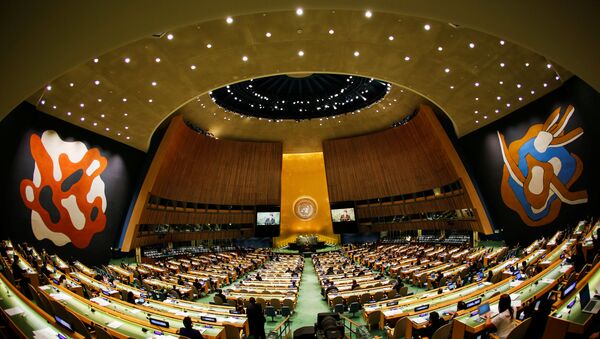"We managed to take leading positions in Eastern Europe, and now virtually everything depends on the permanent UN Security Council members," Jeremic said in an exclusive interview with Sputnik.
So far there "is no clear favorite to succeed Ban Ki-moon in the world's top diplomatic job", the Guardian wrote earlier. The newspaper, however, noted that "third-placed Vuk Jeremic, the former Serbian foreign minister, will almost certainly be vetoed by the US, diplomats say. Washington has not forgiven Jeremić for his opposition to Kosovan independence."
Replying to the question of whether he expects his candidacy to be vetoed by the US, Jeremic stated that it would be "thankless" to speculate on how the permanent members of the Security Council will vote.
Noteworthy is the fact that Jeremic seems to be a man of action and thus stands out from the other candidates. In particular, he has prepared a 80-page UN reform platform, which contains not only suggestions on how to improve UN peacekeeping missions, but also concrete proposals regarding the reform of the UN Secretariat, the reduction of bureaucracy, the fight against corruption as well as the general "modernization" of the UN and its adaption to the realities of the 21st century.
The Serbian politician once said that if the UN can't cope with the current problems, including those in the sphere of security, "the question arises whether one needs the United Nations at all."
Former Serbian Ambassador to the UN Pavle Jevremovic also told Sputnik that the issue of reforming the UN is not new.
Indeed, politicians from all around the world have been debating UN reform over the last several years. In particular, Turkish President Recep Tayyip Erdogan stressed the need to increase the number of permanent members of the UN Security Council, while Zimbabwean President Robert Mugabe threatened that all African countries would withdraw from the UN, if one of them doesn't become a permanent member to represent the African continent.
"It is illogical that Africa does not have its own representative in the UN Security Council. Discussions on this subject are ongoing, but one needs patience and a lot of political agreements to implement this reform. But I don't think that any practical proposals will be considered in the coming years," he said.
The diplomat believes that preconditions for change may appear after the international community enters a period of peace.
"It is necessary to change the atmosphere in international relations, especially with regard to the major powers. It is very risky — to dismantle the available UN mechanism when a political storm is raging outside. This is the same as removing the roof of a house. The UN is a reflection of the conflict-driven era in which we have been living for a long time," he concluded.





